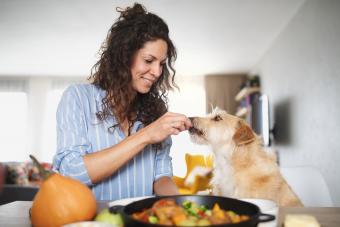
Raw food is uncooked and unprocessed. It includes fresh fruits and vegetables, but also muscle meat, bones, and organ meats. Many pet parents choose to feed their pets a raw diet because they believe it's healthier than processed kibble. But does raw feeding cause aggression in dogs? The answer is no. This is just a myth. According to the ASPCA, there is no scientific evidence that raw, meaty bones or protein cause aggression or other behavioral problems.
The Fresh Blood Falacy
The main reason dog lovers have been led to believe raw feeding causes aggression is due to the fresh blood found within raw meat. The ancestor of all dogs, the wolf, consumes live prey, and they have aggressive tendencies, so the correlation between raw feeding, raw blood, and wolves often goes back to the raw feeding discussion. However, there is a key difference between the wolf and the pet dog.
Wolves live in packs, while dogs live in households. The distinction between the two types of animals is not just in their social structure but also in their genetics and physiology. Dogs have undergone many years of selective breeding by humans to create desired traits such as loyalty, obedience, friendliness, and playfulness. In contrast, wolves remain wild animals without these traits being bred out of them.
The differences in how dogs and wolves eat, and how this affects aggression, are complex. There is no evidence that eating raw meat makes dogs more aggressive.
Raw Feeding and Dopamine
Because of the myth about feeding raw meat, some owners are nervous about giving their dogs raw protein. However, feeding raw mean actually does the opposite. Chewing raw meat and fresh raw meaty bones, known as RMBs in the raw feeding world, has been shown to release dopamine, a feel-good neurotransmitter. Dopamine promotes the creation of norepinephrine and serotonin, which boost mood, improve sleep, and encourage an increased appetite.
Causes of Aggression
When examining how food can be associated with aggression in a nutritional sense, it is possible that nutritional deficiencies could lead to aggressive behaviors. Deficiencies can occur with raw feeding, but are equally or more likely to occur with commercial foods like kibble. These deficiencies include:
Protein Deficiency
The most common nutritional deficiency in dogs is a protein deficiency. Protein deficiency can lead to aggression in dogs because it affects their brain chemistry and nervous system. Dogs that are suffering from protein deficiency may behave aggressively because they don't have enough energy for daily activities or because they have difficulty controlling their emotions or behavior.
If you notice that your dog is suffering from this problem, it's best if you contact your vet for help immediately. This type of aggression can be dangerous for both you and anyone else who comes into contact with your dog.
Tryptophan Deficiency
Tryptophan is a specific amino acid found in protein. Although the deficiency may not be due to protein in general, being deficient in this amino acid could result in aggressive tendencies. Tryptophan deficiency in dogs can lead to other behavioral changes, including mood swings, depression, and anxiety.
Severe cases of tryptophan deficiency in dogs can even cause seizures or coma. Tryptophan is found in protein-rich foods such as meat, fish, dairy products, and eggs.
Food Aggression and Resource Guarding
Food aggression or food guarding occurs when dogs act defensively over food. This has nothing to do with feeding raw meat, and is a behavioral problem many dogs experience while eating normal diets. With food aggression, your dog bites or snaps at you when you try to take their food away or approach them while they are eating. This can be dangerous if they bite you hard enough to break skin or even cause serious injury.
The best way to deal with food aggression is by ignoring it completely. Don't give any attention or reinforcement for this behavior. The more you reinforce it by trying to take their bowl away or give them treats while they're growling at you, the worse it will get!
Choose Your Feeding Style
Whether you feed raw or kibble, your dog could develop aggressive tendencies. Ultimately, raw feeding does not result in aggressive behavior in itself. If your dog begins acting aggressively, it could be due to a nutritional deficiency or generalized behavioral issues. Before you dive into the behavioral causes, request an analysis of your dog's gut microbiome to determine if there are any deficiencies.







